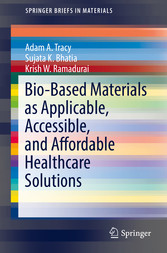Suchen und Finden
Service

Bio-Based Materials as Applicable, Accessible, and Affordable Healthcare Solutions
Adam A. Tracy, Sujata K. Bhatia, Krish W. Ramadurai
Verlag Springer-Verlag, 2018
ISBN 9783319693262 , 53 Seiten
Format PDF
Kopierschutz Wasserzeichen
Geräte
In this book, Nigeria, the most populous country in Africa and a region in the lowest income group per capita, is used to demonstrate the potential for healthcare reorganization and collaboration with the introduction of 'successful' technologies centered around available, bio-compatible, and sustainable natural resources. Our book discusses three of the top killers of children under 5 years of age in Nigeria, pneumonia (20%), diarrheal diseases (15%), and traumatic injuries (4%). These conditions are used as examples to demonstrate the potential for improved pediatric outcomes with treatments engineered from sustainable and natural resources. Furthermore, this book outlines possible action items that can help drive economic growth, educational opportunities, collaborative outreach, and workforce productivity to build a healthy and sustainable community.
Medical technology in the industrialized world has seen rapid advancements leading to increased survival and greater patient outcomes. However, the development and implementation of these resources is not always applicable to regions in need of new and more basic ways to provide treatment. Moore's Law, a paradigm that considers advancement synonymous with increased digitization and optimization of electronic processes, defines the history of technology. However, the functionality of advanced and 'smart' technology is essentially useless in underdeveloped areas. These regions lack some of the basic requirements for innovative medical technologies to impact human health, such as electricity, access to spare parts, computer analysis tools, and network architecture. In addition, the poor physical infrastructure, insufficient management, and lack of technical culture are barriers for entry and sustainability of these technologies. Rather than importing medical devices from industrialized countries, we propose that the mindset and research focus for under developed areas must be on 'successful' technologies. Simply put, these areas need technology that 'gets the job done.'
Medical technology in the industrialized world has seen rapid advancements leading to increased survival and greater patient outcomes. However, the development and implementation of these resources is not always applicable to regions in need of new and more basic ways to provide treatment. Moore's Law, a paradigm that considers advancement synonymous with increased digitization and optimization of electronic processes, defines the history of technology. However, the functionality of advanced and 'smart' technology is essentially useless in underdeveloped areas. These regions lack some of the basic requirements for innovative medical technologies to impact human health, such as electricity, access to spare parts, computer analysis tools, and network architecture. In addition, the poor physical infrastructure, insufficient management, and lack of technical culture are barriers for entry and sustainability of these technologies. Rather than importing medical devices from industrialized countries, we propose that the mindset and research focus for under developed areas must be on 'successful' technologies. Simply put, these areas need technology that 'gets the job done.'
Shop


